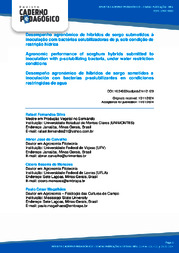Desempenho agronômico de híbridos de sorgo submetidos à inoculação com bactérias solubilizadoras de P, sob condição de restrição hídrica.
Desempenho agronômico de híbridos de sorgo submetidos à inoculação com bactérias solubilizadoras de P, sob condição de restrição hídrica.
Author(s): SILVA, R. F.; CARVALHO, A. J. de; MENEZES, C. B. de; MAGALHAES, P. C.; OLIVEIRA-PAIVA, C. A.; OLIVEIRA, I. C. M.; MARTINS, M.; PORTUGAL, A. F.; SILVA, K. J. da; ALVES, J. B.
Summary: RESUMO- O objetivo do trabalho foi avaliar o desempenho agronômico de híbridos de sorgo inoculados com bactérias solubilizadoras de P, em restrição hídrica. Os ensaios, um com irrigação durante todo o ciclo e outro com suspensão da irrigação aos 49 DAE, foram realizados na unidade experimental do Gorutuba pertencente à Embrapa Milho e Sorgo, localizada em Nova Porteirinha, MG. Os tratamentos foram compostos por 04 híbridos comerciais (BRS310, BRS332, DKB540 e DKB590) de sorgo granífero, com e sem inoculação com bactérias solubilizadoras de P (Bacillus subtilis e Bacillus megaterium). O delineamento experimental foi em blocos casualizados, com 04 repetições e as parcelas foram compostas por 04 fileiras de 3 metros de comprimento, considerando as duas fileiras centrais como área útil. As características avaliadas foram: florescimento, teor de clorofila, fluorescência da clorofila, condutância estomática, área de superfície foliar, diâmetro de colmo, massa de mil grãos, produtividade de grãos, eficiência no uso da água. Os resultados permitiram concluir que a inoculação de bactérias Bacillus subtilis e Bacillus megaterium apresentou efeito apenas sobre o teor de clorofila aos 64 dias após a semeadura e diâmetro de colmo. ABSTRACT- The objective of this work was to evaluate the inoculation with Psolubilizing bacteria on the agronomic performance of sorghum hybrids subjected to water restriction effects. The tests, one with irrigation throughout the cycle (full irrigation) and another with suspension of irrigation at 49 DAE (water restriction), were carried out in the experimental area of Gorutuba belonging to EmbrapaMayze and Sorghum, located in Nova Porteirinha, MG. The treatments consisted of 04 commercial hybrids (BRS310, BRS332, DKB540 and DKB590) of grain sorghum, with and without inoculation with P-solubilizing bacteria (Bacillus subtilis and Bacillus megaterium). The experimental design was in randomized blocks, with four replications and the plots were composed of four rows of 3 meters in length, considering the two central rows as the useful area. The bacterial inoculant was prepared according to Oliveira et al. (2013). The characteristics evaluated were:days to flowering, chlorophyll content, chlorophyll fluorescence, stomatal conductance, leaf surface area, stem diameter, thousand-grain mass, grain yield, water use efficiency. The data obtained were submitted to individual and joint analysis of variance, involving tests with and without water restriction. The results allowed to conclude that the inoculation of Bacillus subtilis and Bacillus megaterium bacteria had an effect only on the chlorophyll content at 64 days after sowing and root diameter.
Publication year: 2024
Types of publication: Journal article
Unit: Embrapa Maize & Sorghum
Keywords: BiomaPhos, Fósforo, Restrição hídrica, Solubilização, Sorghum Bicolor
Observation
Some of Embrapa's publications are published as ePub files. To read them, use or download one of the following free software options to your computer or mobile device. Android: Google Play Books; IOS: iBooks; Windows and Linux: Calibre.
Access other publications
Access the Agricultural Research Database (BDPA) to consult Embrapa's full library collection and records.
Visit Embrapa Bookstore to purchase books and other publications sold by Embrapa.

